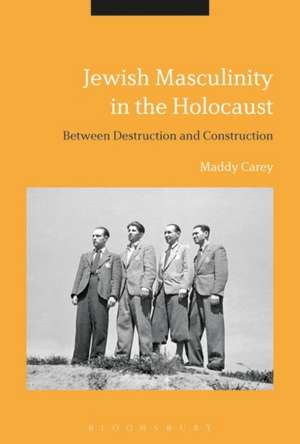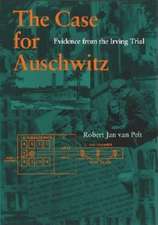Jewish Masculinity in the Holocaust: Between Destruction and Construction
Autor Dr Maddy Careyen Limba Engleză Paperback – 17 apr 2019
| Toate formatele și edițiile | Preț | Express |
|---|---|---|
| Paperback (1) | 230.24 lei 6-8 săpt. | |
| Bloomsbury Publishing – 17 apr 2019 | 230.24 lei 6-8 săpt. | |
| Hardback (1) | 714.77 lei 6-8 săpt. | |
| Bloomsbury Publishing – 4 oct 2017 | 714.77 lei 6-8 săpt. |
Preț: 230.24 lei
Preț vechi: 296.79 lei
-22% Nou
Puncte Express: 345
Preț estimativ în valută:
44.06€ • 47.84$ • 37.01£
44.06€ • 47.84$ • 37.01£
Carte tipărită la comandă
Livrare economică 22 aprilie-06 mai
Preluare comenzi: 021 569.72.76
Specificații
ISBN-13: 9781350108486
ISBN-10: 1350108480
Pagini: 224
Dimensiuni: 156 x 234 x 13 mm
Greutate: 0.32 kg
Editura: Bloomsbury Publishing
Colecția Bloomsbury Academic
Locul publicării:London, United Kingdom
ISBN-10: 1350108480
Pagini: 224
Dimensiuni: 156 x 234 x 13 mm
Greutate: 0.32 kg
Editura: Bloomsbury Publishing
Colecția Bloomsbury Academic
Locul publicării:London, United Kingdom
Caracteristici
Uses a vast wealth of primary accounts, made up of diaries, memoirs, journals and newspapers, as part of the analysis
Notă biografică
Maddy Carey is an independent scholar who completed her PhD in History at Royal Holloway, University of London, UK.
Cuprins
Introduction 1. Jewish Masculinity in Theory and Practice 2. Masculinity in Crisis: Persecution and Collapse 3. Masculinity Reasserted: Enclosure and Stability 4. Masculinity Upheld: Fatherhood and Filial Respect Conclusion Bibliography
Recenzii
By combining gender theory with a thorough analysis of a wide range of sources, this study makes an important contribution to the still under-researched topic of masculinity in both Jewish history and Holocaust history.
A study that hones in on the experiences of Jewish men during the Holocaust as a 'gendered experience' is long overdue, and Maddy Carey's work fills this lacuna. Skillfully, and with a firm grasp on gender theory, she offers a rich and nuanced picture of how Jewish men negotiated their roles at home and in public at the onset of the Holocaust and during their enclosure in the ghettos. Wisely, Carey limits herself to four specific countries. Her original analysis will surely open the doors for more studies to follow that analyze Jewish men's experiences in other places and circumstances. The book ends with a compelling chapter on young Jewish men writing about their fathers during the Shoah.
A study that hones in on the experiences of Jewish men during the Holocaust as a 'gendered experience' is long overdue, and Maddy Carey's work fills this lacuna. Skillfully, and with a firm grasp on gender theory, she offers a rich and nuanced picture of how Jewish men negotiated their roles at home and in public at the onset of the Holocaust and during their enclosure in the ghettos. Wisely, Carey limits herself to four specific countries. Her original analysis will surely open the doors for more studies to follow that analyze Jewish men's experiences in other places and circumstances. The book ends with a compelling chapter on young Jewish men writing about their fathers during the Shoah.








